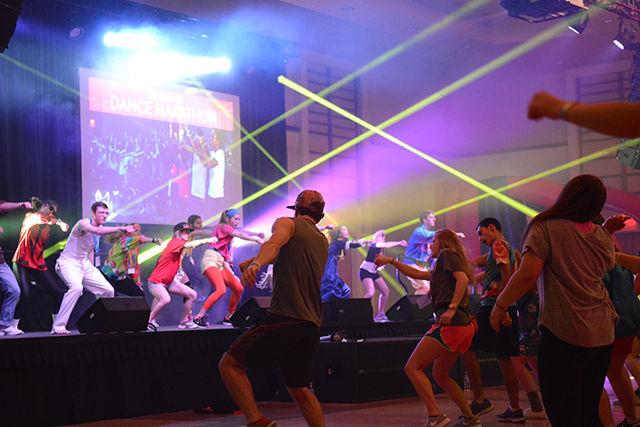
Katie Mallinson
NC State held it's 4th annual dance marathon in the Talley State Ballroom. The event spanned from 10am Saturday, February 27th to 2am the following Sunday. Particiants followed along with the dancers on stage as they danced to songs throughout the day. The event raised over $80,000 by the end of the night, which was $13,000 more than the year before.
At first glance, a room filled with hundreds of students dancing to the latest hits in Talley Ballroom may seem trivial. That is, until you understand the cause — it’s “For the Kids,” or FTK. This year, Dance Marathon at NC State raised a total of $80,312.23 for Duke Children’s Hospital, the local Children’s Miracle Network Hospital.
During the event, students remained standing for 16 hours and participated in a variety of activities.
“The whole point of 16 hours with no sitting is we are supposed to experience how the kids feel not getting a break from being sick,” said Maddie Afshar, a junior studying psychology and the director of Greek Relations for Dance Marathon.
During the event, Mike Holdner, the father of “Miracle Kid” Josh Holdner, shared a part of his son’s battle with Tyrosinemia Type I, a condition that prohibits the body from breaking down Tyrosine.
“It’s an amino acid that his body can’t process,” Mike Holdner said. “Since his body can’t get rid of it, toxins form. Over time, those toxins can become cancerous.”
Doctors told the Holdners that most children with Josh’s condition didn’t live past the age of 10, and the family only personally knew two other kids older than Josh with his condition. However, Mike Holdner said his family has found hope found at Duke Children’s Hospital and through Dance Marathon. Today, Josh is 17 years old.
“[Dance Marathon] has given us a voice to be heard, to tell our story,” Mike Holdner said. “… If this tells us anything about what the future holds, there is a beacon of hope; it looks bright.”
In addition to dancing, attendees were encouraged to participate in last-minute fundraising efforts through activities such as “power hours.”
During one power hour, Bryan Holder, Dance Marathon regional manager, challenged dancers to raise $63, which represents the 63 beds at Duke Children’s Hospital.
In the same power hour, Holder asked audience members to take out their phones and hold them in the palm of their hands.
“This is the size and weight of babies that are born prematurely in the neonatal intensive care unit,” Holder said. “The size of your fingernail is the size of a premature baby’s heart. Imagine being a doctor and trying to work on something that tiny. The funds that you all are raising helps to pay for equipment for babies in the neonatal intensive care unit.”
Pi Beta Phi sorority was the highest donating Greek team with $6,433, surpassing its initial goal of $1,000.
“It’s been really exciting the amount of support we’ve gotten from our chapter, said Grace Pittman, a junior studying communication and Pi Beta Phi’s vice president of philanthropy. “It feels really awesome to be here and to give to such a worthy cause.”
Other Fraternity and Sorority Life organizations participated as well, including the second-place Greek team Kappa Alpha Theta sorority, who raised $4,245.
“Just knowing that as a Greek community everyone can come together and put their differences aside for a meaningful cause like this,” Afshar said. “It just shows how much Greek Life can do at NC State.”
Keri Christianson, assistant director of Special Programs at Duke Children’s Hospital, said the money raised helps pay for the “warm and fuzzy touches” that make a hospital a children’s hospital.
“These are things insurance doesn’t cover,” Christianson said.
These programs include the “Child Life Team,” which received funding for a pill-swallowing program.
“A lot of times when our kids are taking oral medication, they may be scared to swallow their pill, or the pill may be really large and it’s really hard to swallow,” Christianson said. “Our Child Life Team, thanks to the money that you guys raised, they have programs in place where the kids can start with a little tiny placebo pill and work all the way up to this big giant pill that they need to take.”
Another use of funds is to pay for about 100 kids to go to Camp Kaleidoscope. The camp gives sick children who might not otherwise have the chance the opportunity to experience summer camp, as it is fully staffed with doctors and nurses, as well as counselors who are trained medical professionals.
The gratitude of the “Miracle Kids” and parents in the room was evident.
“I really can’t thank you enough for the efforts,” Mike Holdner said to the participants. “You guys are doing amazing things.”